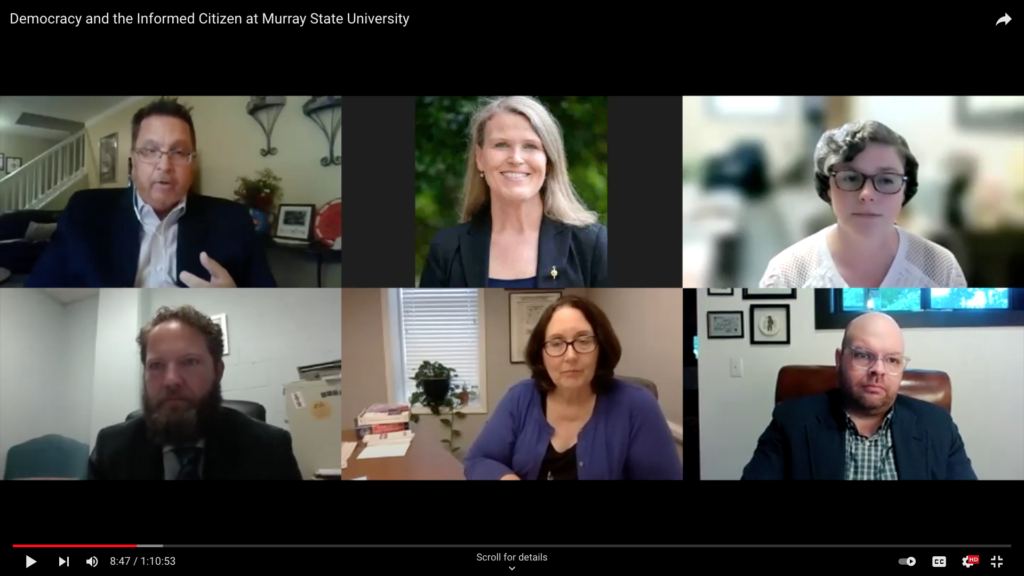Raleigh Hightower
Contributing Writer
rhightower@murraystate.edu
In an effort to promote informed democratic participation, several Murray State faculty members participated in a virtual discussion panel on Sept. 14, titled “Democracy and the Informed Citizen.”
The panel, which was sponsored by the Kentucky Humanities Council, examined the essential role journalism and the humanities play in creating informed citizens.
The Kentucky Humanities Society, in partnership with Andrew W. Mellon Foundation and the Federation of State Humanities Councils, is hosting a series of discussions throughout the state focusing on the intersection of journalism and politics.
Three of Murray State’s faculty members were involved in the discussion: Drew Seib of the political science and sociology department was featured as a panelist, Research and Instruction Librarian and Associate Professor Dana Thompson moderated and Melony Shemberger of the journalism and mass communications department co-organized the event.
The special guest panelist was Tony Messenger, a Pulitzer Prize winning columnist for the “St. Louis Post-Dispatch.” Messenger received the Pulitzer Prize for his commentary work on debtor’s prisons in Missouri. Messenger has worked with newspapers in Colorado, Arizona, Nebraska, South Dakota and Missouri.
Other panelists included Jennifer Brown, founder of the “The Hoptown Chronicle,” and Chad Lampe, station manager of WKMS and chair of the Kentucky Public Radio Stations.
The panel’s discussion focused on the intersection of transparency and news literacy on voting and democratic processes. One of the first topics the panel discussed was the influence of trust and transparency in media on processes such as voting.
“At those newspapers in particular, voters got almost all their information from their local newspaper,” Messenger said. “What worries me about our current environment is that there are many attempts to damage the mainstream media as a sort of political strategy.”
The panelists also discussed how Facebook has become a new environment for politics and political action.
“Some candidates have highly developed Facebook groups that go beyond their campaign,” said Brown. “They have become places where candidates establish themselves as someone who does good in the community.”
Social media was a topic that came up several times throughout the panel’s discussion. The panelists urged people to carefully consider where they get their news and the intent publishers have.
Seib described Twitter and Facebook as “pseudo-media,” and Brown warned that journalists have to go through a process of verification that people who post information to social media do not.
Messenger said journalists today have less freedom now than they had in the past. He believes journalists have the power to say “no” and keep bad information from being published.
Now, however, Messenger said the pressure put on journalists to be objective to both sides of the political spectrum has eliminated some of the power journalists once had to control misinformation.
Misinformation and the role it plays in politics and our daily lives, especially during the COVID-19 pandemic, was another topic integral to the panel’s discussion.
Lampe said one reason why information surrounding COVID-19 has become widely questioned is because trust has begun to deteriorate in institutions that were once widely trusted, such as the CDC.
In the closing moments of the discussion, each panelist shared their tips for combating misinformation and becoming a more informed citizen.
Messenger urged that people check multiple sources for their information; Seib urged that people carefully check who and where their information comes from; Lampe warned that social media often sensationalizes the truth; and Thompson warned that images can often be manipulated.
The full panel discussion is available on the Kentucky Humanities Council’s website under the “programs” tab or at https://www.kyhumanities.org/programs/democracy-and-the-informed-citizen.


























































































